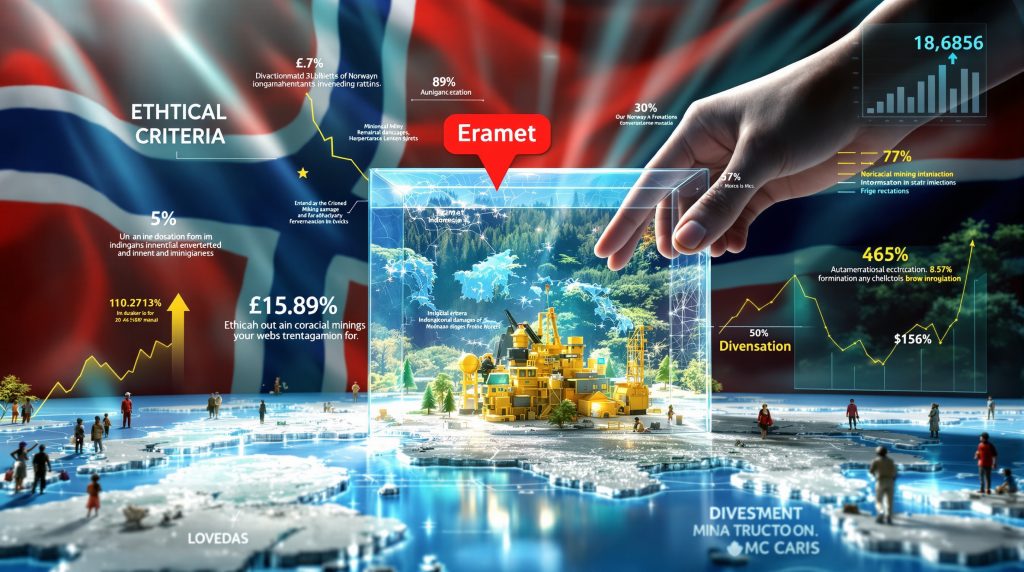What Led to Norway's Sovereign Wealth Fund Excluding Eramet?
Norway's sovereign wealth fund, one of the world's largest investors with approximately $2 trillion in assets, recently made headlines by excluding French mining group Eramet from its investment portfolio. This decision represents a significant milestone in the evolution of ethical investment practices among major financial institutions and highlights the increasing scrutiny that mining operations face regarding environmental sustainability and human rights standards.
The fund's operator, Norges Bank Investment Management (NBIM), divested its 0.44% stake in Eramet, valued at approximately $6.8 million as of mid-2025, following a formal recommendation from the fund's ethics watchdog.
The Ethical Grounds for Exclusion
The Council on Ethics, which advises Norway's sovereign wealth fund on ethical matters, cited two primary concerns that led to this significant decision:
- Severe environmental damage linked to Eramet's mining operations in Indonesia
- Serious human rights violations affecting uncontacted indigenous peoples in the region
According to the Council's statement, there was "an unacceptable risk that the company is contributing to, or is itself responsible for, severe environmental damage and serious violation of the human rights of uncontacted indigenous people."
This exclusion reflects Norway's increasingly rigorous approach to responsible investment, particularly regarding natural resource extraction in environmentally sensitive areas.
How Does Norway's Ethical Investment Framework Function?
Norway's sovereign wealth fund operates under one of the world's most comprehensive ethical investment frameworks. This framework has evolved significantly since its inception, allowing the fund to align its vast financial resources with Norway's values and commitment to sustainable development.
The Three-Pillar Approach to Responsible Investment
The fund employs three main strategies to ensure its investments meet ethical standards:
- Exclusion – Removing companies from the investment universe that violate fundamental ethical norms
- Observation – Placing companies under monitoring for potential future violations
- Active engagement – Working directly with companies to improve their practices and address concerns
This multi-faceted approach allows the fund to exercise influence in different ways, depending on the severity of concerns and the potential for positive change.
Key Ethical Criteria for Mining Investments
When evaluating mining companies specifically, Norway's fund applies several specialized criteria:
- Environmental impact assessment and management systems
- Indigenous rights protection and consultation processes
- Labor conditions and community relations
- Governance transparency and anti-corruption measures
- Climate impact and sustainable mining transformation
These criteria reflect Norway's recognition that mining activities, while economically important, carry significant environmental and social risks that must be carefully managed.
Why Was PT Weda Bay Nickel Operation Central to the Decision?
The focal point of the ethics council's concerns was Eramet's role as operator of the PT Weda Bay Nickel joint venture in Indonesia. This operation has faced increasing scrutiny from environmental groups, indigenous rights advocates, and now financial institutions.
The Controversial Indonesian Joint Venture
PT Weda Bay Nickel has become increasingly controversial for several reasons:
- Its operations in environmentally sensitive areas with high biodiversity
- Potential impacts on indigenous communities, including uncontacted groups
- Regulatory compliance issues with Indonesian authorities
- Questions about environmental management practices
These concerns accumulated to a point where the Council on Ethics determined that continued investment represented an unacceptable ethical risk.
Regulatory Challenges in Indonesia
The fund's exclusion decision coincided with separate regulatory actions by Indonesian authorities, highlighting broader governance issues surrounding the operation:
- Indonesian officials seized plots spanning hundreds of acres from PT Weda Bay Nickel
- The seizure was due to lack of proper forestry permits
- This action was part of Indonesia's broader crackdown on illegal resource exploitation
- President Prabowo Subianto announced the identification of over 1,000 illegal mining operations across Indonesia
This regulatory context suggests that the ethical concerns identified by Norway's fund may reflect broader mining permitting challenges at the operation.
How Has Eramet Responded to the Exclusion?
Eramet's response to the exclusion decision provides insight into how companies navigate the increasing prominence of ethical investment criteria in global finance.
The Company's Defense and Position
In its official response, Eramet expressed deep regret over the exclusion decision and stated it was reviewing the fund's report. The company defended its role in the joint venture by emphasizing:
- Its position as a minority shareholder since 2017
- Claims of transparency and high operational standards
- Efforts to positively influence environmental stewardship
- Promotion of best mining practices within the operation
According to Eramet's statement to Reuters, the company has "consistently exercised its role as minority shareholder with transparency and high standards, aiming to positively influence and make constructive proposals," adding that it had been "promoting environmental stewardship and best mining practices."
This defense highlights the complex position of multinational mining companies operating in challenging jurisdictions, particularly when they hold minority positions in joint ventures.
What Are the Broader Implications for Mining Investment?
The exclusion of Eramet from Norway's sovereign wealth fund portfolio represents more than an isolated incident—it signals shifting expectations for the entire mining sector regarding environmental and social governance.
Setting New Standards for Ethical Mining Investment
This case establishes important precedents for mining companies and investors:
| Aspect | Traditional Approach | Emerging Standard |
|---|---|---|
| Environmental Impact | Often secondary to production targets | Primary consideration for investment decisions |
| Indigenous Rights | Frequently overlooked or minimized | Critical ethical requirement with financial consequences |
| Regulatory Compliance | Minimum necessary adherence | Proactive engagement and transparency expected |
| Transparency | Limited disclosure of impacts | Comprehensive reporting and verification required |
These shifting standards reflect a fundamental change in how financial markets value mining assets, with environmental and social risks increasingly factored into investment decisions.
Impact on Other Mining Companies and Investors
The Norwegian fund's decision sends strong signals to multiple stakeholders:
- Other mining companies – Demonstrating the potential financial consequences of ethical violations
- Institutional investors – Setting benchmarks for responsible investment practices in the extractive sector
- Regulatory authorities – Reinforcing the importance of effective oversight and enforcement
- Indigenous communities – Validating their rights in resource development contexts
As one of the world's largest and most influential investors, Norway's sovereign wealth fund decisions ripple throughout global capital markets, potentially influencing other investors' approaches.
How Does This Fit Into Global ESG Investment Trends?
The exclusion of Eramet exemplifies the accelerating integration of Environmental, Social, and Governance (ESG) factors into investment decisions worldwide, particularly in sectors with high environmental impact.
The Growing Influence of ESG Criteria
This case demonstrates how ESG considerations are transforming capital allocation:
- Environmental considerations increasingly influence which projects receive funding
- Social impact assessments have become standard due diligence components
- Governance standards now extend to operations in developing regions
- Transparency requirements continue to expand for public companies
Mining companies now face more rigorous scrutiny from investors who are increasingly concerned about climate change, biodiversity loss, human rights, and resource scarcity.
Comparative Approaches to Ethical Mining Investment
Different sovereign wealth funds and major institutional investors approach mining ethics with varying levels of stringency:
- Norway's approach – Comprehensive ethical framework with active exclusion mechanisms
- Australian funds – Growing emphasis on indigenous rights and environmental impact
- Canadian pension funds – Increasing focus on community relations and sustainability
- Middle Eastern SWFs – Emerging interest in governance and environmental standards
This diversity of approaches creates a complex landscape for mining companies to navigate, with the most rigorous standards often setting the pace for others to follow.
What Does This Mean for the Future of Mining Finance?
The exclusion of Eramet signals continued evolution in how mining projects secure capital, with long-term implications for project development, operational practices, and financial structures.
New Expectations for Mining Operations
Mining companies seeking investment now face heightened expectations:
- More rigorous due diligence on environmental impacts before financing
- Comprehensive indigenous consultation processes as a prerequisite
- Transparent regulatory compliance documentation throughout project lifecycles
- Regular sustainability reporting and third-party verification
- Proactive community engagement programs with demonstrable benefits
These expectations increase project development costs but may also reduce long-term operational risks and social license challenges.
The Shift Toward Sustainable Resource Development
The exclusion of Eramet represents a significant milestone in the ongoing transformation of mining finance toward models that prioritize:
- Long-term environmental sustainability over short-term extraction
- Respect for indigenous rights and cultural heritage
- Transparent governance and regulatory compliance
- Community benefit-sharing and development
This transformation reflects growing recognition that mine reclamation practices and sustainable resource development ultimately protect both environmental values and long-term shareholder returns.
How Can Mining Companies Adapt to These Ethical Standards?
For mining companies, adapting to heightened ethical expectations requires systematic changes to governance, operational practices, and stakeholder engagement approaches.
Building Ethical Mining Operations
Several strategies have proven effective for companies seeking to align with evolving ethical standards:
- Implementing comprehensive environmental management systems with independent verification
- Establishing meaningful indigenous consultation protocols with free, prior, and informed consent
- Developing transparent community benefit agreements with measurable outcomes
- Adopting international best practices for sustainability reporting
- Ensuring rigorous regulatory compliance documentation and transparency
Companies that proactively adopt these practices may gain competitive advantages in accessing capital and securing social license to operate.
Case Studies in Successful Adaptation
Several major mining companies have successfully navigated the transition to more ethical operations:
- BHP's approach to indigenous engagement in Australia, featuring comprehensive agreements and cultural heritage protection
- Rio Tinto's response to governance failures and subsequent reforms following the Juukan Gorge incident
- Anglo American's community development initiatives across multiple regions, demonstrating long-term commitment to social impact
These examples demonstrate that adaptation is possible, though it often requires significant organizational change and executive commitment.
What Questions Should Investors Ask About Mining Ethics?
For investors concerned about ethical risks in mining, developing a systematic approach to evaluation is essential for effective due diligence.
Key Due Diligence Questions for Mining Investments
Investors should consider:
- How thoroughly does the company assess environmental impacts, and are these assessments independently verified?
- What processes exist for indigenous consultation and consent, and do they meet international standards?
- How transparent is the company about regulatory compliance, including permits and approvals?
- What mechanisms ensure community benefits from operations, and are these benefits documented?
- How are human rights protected throughout the supply chain, including at joint venture operations?
These questions help investors identify potential ethical risks before they materialize as financial losses.
Red Flags in Mining Operations
Certain warning signs may indicate heightened ethical risks:
- Operations in environmentally sensitive or protected areas without comprehensive mitigation plans
- Presence of indigenous communities without formal agreements or consultation processes
- History of regulatory violations or permit issues suggesting governance weaknesses
- Limited transparency in environmental reporting or impact disclosure
- Weak community engagement programs or history of social conflict
Recognizing these red flags early allows investors to engage with companies constructively or avoid exposure to problematic operations entirely.
The Future of Ethical Mining Investment
Norway's sovereign wealth fund exclusion of Eramet demonstrates how ethical considerations have become central to mining investment decisions. This case illustrates the financial consequences of failing to meet evolving standards for environmental protection and human rights.
As global demand for minerals continues to grow, particularly for materials essential to the energy transition, mining companies face dual pressures: increasing production while adhering to more stringent ethical standards. Those that successfully navigate this challenge will likely gain preferential access to capital and stronger social licenses to operate.
The Eramet case serves as both a warning and a roadmap for mining industry trends and investors navigating the complex intersection of resource development, environmental protection, and human rights in the modern global economy.
FAQs About Ethical Mining Investment
What criteria do sovereign wealth funds use to evaluate mining companies?
Sovereign wealth funds typically evaluate mining companies based on environmental impact, human rights records, indigenous relations, governance transparency, and regulatory compliance history.
How can mining companies address concerns about indigenous rights?
Mining companies can develop comprehensive indigenous engagement protocols, obtain free, prior, and informed consent, establish benefit-sharing agreements, and respect traditional land rights.
What environmental standards are mining investors increasingly expecting?
Investors increasingly expect comprehensive environmental impact assessments, biodiversity protection plans, water management strategies, emissions reduction targets, and uranium mining halt when necessary.
How does ethical exclusion affect a mining company's operations?
Ethical exclusion can limit access to capital, increase borrowing costs, damage reputation, complicate regulatory relationships, and potentially trigger similar actions by other investors.
Are ethical investment standards consistent across different countries?
Ethical investment standards vary significantly across jurisdictions, with Nordic countries typically maintaining the most stringent requirements, while standards continue to evolve in other regions according to the Norwegian wealth fund's announcement.
Want to Spot the Next Major Mineral Discovery?
Discovery Alert's proprietary Discovery IQ model delivers instant notifications when significant ASX mineral discoveries are announced, giving you a crucial market advantage before wider recognition. Explore historic returns from major discoveries and learn how to position yourself ahead of the market at Discovery Alert's dedicated discoveries page.




